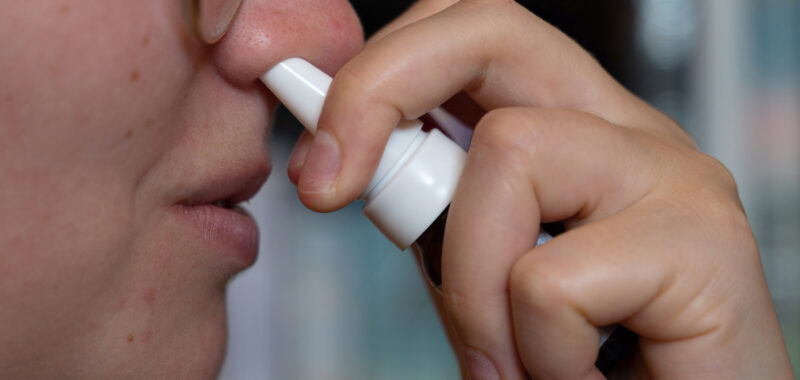Johnson & Johnson has announced the FDA’s approval of a first-of-its-kind, esketamine nasal spray called Spravato for the standalone treatment of major depressive disorder (MDD), PTSD, and similar psychiatric conditions. The decision builds on previous FDA approval for the drug’s treatment when combined with additional oral antidepressants. While Spravato’s underlying mechanisms remain unclear and only be available to certain qualifying adults, the new option could soon provide help for many in the US dealing with treatment-resistant depression.
Over 21 million Americans report depression-related issues. Of those, an estimated one-in-three people don’t see improvement after using many of the most common prescription offerings. However, medication involving the anesthetic, ketamine, has shown promise in recent years for treating these hard-to-resolve depressive symptoms. But these often rely on intravenous administration in supervised settings like hospitals and clinics, which limit their accessibility for many patients. Meanwhile, some critics continue to voice concerns about lingering long-term health questions and unregulated clinics. Licensed medical providers have also faced dwindling supplies as a result of increased demand.
“Treatment-resistant depression can be very complicated, especially for patients who do not respond to oral antidepressants or cannot tolerate them. For too long, healthcare providers have had few options to offer patients much-needed symptom improvement,” Bill Martin, Johnson & Johnson’s Therapeutic Area Head in Neuroscience, said in a statement on January 21st.
Researchers including Martin have spent years studying an alternative to direct ketamine IV injections and shots. This treatment is delivered through a nasal spray and relies not on ketamine, but one of its two primary components called esketamine. The end result, Spravato has since been approved in 77 countries and prescribed to over 140,000 patients. As of Tuesday, the US is now also one of those countries to allow it as its own treatment without any additional prescriptions.
Like many other antidepressants, Spravato works as a non-selective, non-competitive antagonist of the N-methyl-D-aspartate (NMDA) receptor. Where it differs, however, is its ability to travel through a different brain pathway affecting the neurotransmitter, glutamate. An imbalance in a person’s glutamate levels can lead to exhaustion, concentration issues, and clinical depressive problems.
The FDA fast-tracked Spravato’s approval through its Priority Review process after receiving results from a randomized, double-blind, placebo-controlled study of the medication. Volunteers were sorted into two groups—one that received the prescribed medication, and another control group given a placebo. Participants took a commonly used 10-question survey known as the Montgomery-Asberg Depression Rating Scale before and after the 28-day trial to contextualize their overall mental health state.
At the end of week four of the trial, just 7.6-percent of the placebo group reported a MADRS score indicating remission, compared to 22.5-percent of those taking Spravato. According to Johnson & Johnson, Spravato’s safety profile as a standalone treatment “was consistent with the existing body of clinical and real-world data when used in conjunction with an oral antidepressant,” adding that researchers also didn’t identify any new safety concerns.
Spravato is taken by the user under the supervision of a healthcare provider in a clinic. Because reported side-effects include temporary nausea, vomiting, and tiredness, healthcare supervisors require a patient to wait a short period of time before clearing them to leave. Patients are also advised against driving for the rest of the day, and are required to have someone take them home after each treatment. Other side effects potentially include temporarily increased blood pressure, mental haziness, and bladder problems.
Although the data indicates Spravato (and, by extension esketamine) helps many patients with treatment-resistant depression, researchers still aren’t sure how it technically works. But with most users reporting only mild-to-moderate side-effects and the FDA’s approval, Spravato may offer a new option for the many Americans who have long struggled with drug-resistant depression.


